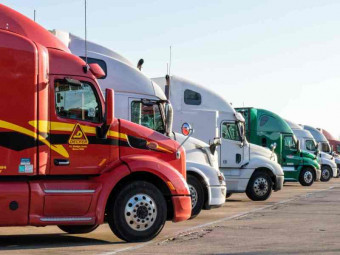Logistics Of Crude Oil And Petroleum Products Oil And Gas G
Tags: Oil and Gas Industry
Explore the logistics of crude oil and petroleum products - transport and dispatch of oil and gas demystified
Last updated 2022-01-10 | 4.6
- Gain a broad perspective of the global oil and gas business : supply and transportation- Understand logistics and supply principles and practices
- Use Worldscale reference to charter a ship and to calculate the profitability
What you'll learn
* Requirements
* There are no pre-requisites for this course. We will walk through the logistic processes step by stepDescription
Dear student,
Ever wondered how crude oil is transported from remote production wells like in Siberia or Arabian desert to refineries ? and then how commercial petroleum products like gasoline or diesel fuel are dispatched from refineries to your gas station so that you can fill up your car and go to work ?
If you're curious about that then you've come to the right place !
This course is designed to give you a comprehensive picture of the international oil logistics : from transport of crude oil to refineries, to dispatch of commercial petroleum products.
The course is organized into 2 parts :
The first part is an analysis of transport problems, particularly the transport of crude oil. We discuss : sea transport first, different types of tankers, different types of charters, costs and prices for this type of transport, the regulatory framework and operational matters. Then we consider transport by pipeline.
The second part deals with the different ways of delivering finished products from a refinery : by water, pipeline, rail or road, and the different restrictions that apply to them. Finally, we review the various controls that apply to dispatch.
This training course will highlight :
Up-to-date global statistics of oil & gas
Update you of the various methods and technologies used to transport oil, gas and their products
Essentials of international oil and gas supply, economics and transportation
Primary logistics – tanker freight costs and chartering
Supply logistics – major international pipelines, shipping routes, and choke points
By the end of this training course, you will be able to :
Gain a broad perspective of the global oil and gas business : supply and transportation
Understand logistics and supply principles and practices
Use Worldscale reference to charter a ship and to calculate the profitability
This training course is suitable to a wide range of professionals but will greatly benefit :
Oil & gas field personnel
Operations, maintenance and engineering trainees
Other support staff who have an interest in increasing their understanding of the oil & gas logistics
Business Development Managers, Corporate Planning Professionals and Business Analysts switching disciplines who are required to have a better understanding of this stimulating field
Energy industry journalists and reporters
Professional personnel such as legal, banking, insurance, finance dealing with oil supply and transportation
What makes me qualified to teach you :
I hold 2 chemical engineering degrees from the "Ecole Nationale Supérieur de Chimie de Paris, Chimie ParisTech" and the "Institut Français du Pétrole, IFP School", 2 of the top tier chemical engineering schools in Europe with a major in refining and petrochemicals.
For the last 10 years I have been working as a chemical engineer for an international oil company where I have taken on different technical challenges in petrochemicals manufacturing, petroleum refining, logistics, planning and business analyses.
What's next ?
If you are interested in other topics related to chemical engineering or to the oil and gas industry, and would like a training course on them, built the way this current course is, then please let me know.
So that you are aware, we are in the process of building the following courses :
Oil and Gas : History, markets, pricing, economics and petroleum products
Crude oil refining demystified
Storage of petroleum, chemicals and LPG
Overview of the petrochemical industry 1/3 : Steam cracking
Overview of the petrochemical industry 2/3 : Making polymers (PE, PP, PS, PVC)
Overview of the petrochemical industry 3/3 : Other petrochemicals (Benzen, Xylene, Toluene, Styrene, Cumene, Phenol...)
Distillation, absorption and stripping : Engineering basics and equipment
Heat transfer technologies : Process furnaces and heat exchangers
Rotating equipment basics 1/4 : Centrifugal pumps
Rotating equipment basics 2/4 : Positive displacement pumps
Rotating equipment basics 3/4 : Centrifugal compressors
Rotating equipment basics 4/4 : Reciprocating compressors
Valves and piping in the Oil and Gas
Fundamentals of process control used in industrial plants
Process instruments used in industrial plants
General inorganic chemistry
Organic chemistry
Essential physics
IR and NMR spectroscopies
and much more...
So with no further ado, go ahead, click the enroll button and we will see you in the first section !
Cheers,
WR Training
Spread the wings of your knowledge
Who this course is for:
- Students in logistics, engineering, refining, petrochemicals...
- Oil & gas field personnel
- Operations, maintenance and engineering trainees
- Other support staff who have an interest in increasing their understanding of the oil & gas logistics
- Business Development Managers, Corporate Planning Professionals and Business Analysts switching disciplines who are required to have a better understanding of this stimulating field
- Energy industry journalists and reporters
- Professional personnel such as legal, banking, insurance, finance dealing with oil supply and transportation
- Anyone seeking to broaden the sphere of his knowledge and discover the logistics of oil and gas
Course content
8 sections • 27 lectures








 This course includes:
This course includes:
![Flutter & Dart - The Complete Guide [2022 Edition]](https://img-c.udemycdn.com/course/100x100/1708340_7108_5.jpg)















